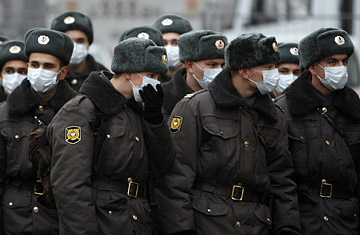
High percentage of Russians have no trust in police force
(2 of 2)
Critics, however, deride the new measures as toothless and say tackling the problem requires serious structural reforms. Former St. Petersburg police investigator and prominent crime journalist Yevgeny Vyshenkov compared Nurgaliyev to a collective farm owner whose chickens keep dying mysteriously. "To fix the situation, his great idea is to have the chicken troughs made in the shape of a triangle, but the chickens keep dying," Vyshenkov said. "Then he has the troughs made in the shape of a rectangle, but the chickens keep dying. Then a worker tells him all the chickens have died, and the owner says: 'What a shame, I had so many more great ideas.'"
At the heart of the problem, experts say, are the paltry wages that hinder the recruitment of good officers and encourage police to supplement their wages through graft and criminal rackets. Dymovsky, the Internet whistleblower, complained that his monthly wage as a policeman in the Black Sea port of Novorossiisk was only 14,000 rubles ($487) and that he worked extensive overtime for no additional pay. "What motivation is there to serve honestly?" said Kirill Kabanov, head of the National Anticorruption Committee, a nongovernmental organization. Many prospective recruits eschew police forces in favor of security agencies such as the Federal Security Service, or FSB, the main successor agency to the KGB, which pays about $1,500 to $2,100 per month, he adds.
But the problems run deeper than just meager salaries, says Alexander Gurov, a senior lawmaker with Putin's ruling United Russia party and a former head of the anti-organized crime units in the Soviet Interior Ministry. He says the roots of the current difficulties can be traced to the collapse of the Soviet Union, when police officers went into the private sector en masse, fed up with low pay, corruption and the brazen violence sweeping the country. He estimates that 100,000 officers left the profession each year from 1991 to 2004 nationwide. "There are very few people anymore who work as police officers because it is their calling," Gurov says.
Russian President Dmitri Medvedev has called rampant corruption a threat to national security and made an anti-corruption drive one of the signature campaigns of his presidency. However, even he is realistic about what can be done. In a recent interview with the German magazine Der Spiegel, Medvedev questioned a pledge by Nurgaliyev earlier this year to eradicate corruption in the nation's police forces over the course of a month. "I would hope that the Interior Minister has a clear idea of how to combat corruption," Medvedev said. "This certainly cannot be achieved in one month. I also think that he only meant the most grievous offenses in his ministry. Rooting out corruption will keep us busy for years."
Until the Kremlin finds the money to overhaul the system completely, Vyshenkov says a few cheap measures could help matters. For one, police officers should be required to wear uniforms embossed with the motto: "I selflessly serve the law." "It's not going to deter all officers from corruption," he says. "But maybe it will make three out of 100 embarrassed to take a bribe."
